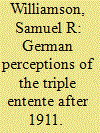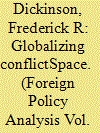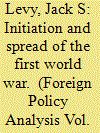| Srl | Item |
| 1 |
ID:
103943


|
|
|
|
|
| Publication |
2011.
|
| Summary/Abstract |
After 1911, Germany felt increasingly threatened by the Triple Entente. Secret intelligence from the Russian embassy in London revealed a growing cohesion among the Triple Entente partners: Britain, Russia, and France. In particular, Berlin feared the success of Raymond Poincaré of France, first as premier and then later as President, as he worked to convert the entente with London into an alliance and to reinforce alliance ties with Russia. In the summer of 1914 came the murders at Sarajevo of Habsburg Archduke Franz Ferdinand and his wife. When Vienna decided to punish Serbia, Berlin agreed to support them in the belief that Russia would not back Serbia. But even if Russia did support Serbia, better a war now than later. Rather than be intimidated, Russia took escalatory actions of its own to help Serbia and their French ally. The First World War was the result.
|
|
|
|
|
|
|
|
|
|
|
|
|
|
|
|
| 2 |
ID:
103941


|
|
|
|
|
| Publication |
2011.
|
| Summary/Abstract |
Developments in East Asia strengthen the claims of "ConflictSpace." The contrast between general war in 1914 and the limited Sino-Japanese War of 1894-1895 may be explained, in large part, by the higher degree of connectivity in 1914. The difference between Japan's swift declaration of war in 1914 and hesitation by China and the United States may, likewise, be attributed to Japan's higher connectivity. A host of independent variables, such as political will and relative military strength, can wreak havoc with the basic assumptions of ConflictSpace. But used cautiously as part of an ongoing discussion between social scientists and historians, ConflictSpace may effectively gauge the relative likelihood of the spread of war.
|
|
|
|
|
|
|
|
|
|
|
|
|
|
|
|
| 3 |
ID:
103940


|
|
|
|
|
| Publication |
2011.
|
| Summary/Abstract |
The ConflictSpace framework begins with the assumption that the factors leading a war to spread are different from the factors leading to the initiation of war. I argue that the presumed analytic separation of the initiation and spread of war is misleading because leaders' expectations of how a war might spread have a significant effect on their decisions to initiate war. I demonstrate this for the July 1914 crisis, and in the process I question Vasquez et al.'s argument that the key to the outbreak of the war lies in the Austro-Serbian relationship. I end by suggesting that the impact of the anticipated spread of war on the initiation of war probably varies across cases and constitutes an empirical question to investigate.
|
|
|
|
|
|
|
|
|
|
|
|
|
|
|
|
| 4 |
ID:
103942


|
|
|
|
|
| Publication |
2011.
|
| Summary/Abstract |
Swimming in a sea of military defeats, the Ottoman leadership, it seems, should have opted for less war, not more, in 1914. The generation at the helm of the state, however, welcomed the July Crisis not as a reprieve but as an opportunity to end the empire's international isolation. Whereas the Ottoman leaders of the nineteenth century had launched a broad program of reforms in their search for a place in the European Concert, by the twentieth century a new crop of radical leaders had taken charge of the state. Many of these new leaders came from borderlands, from territories now lost, and they believed that the survival of their state rested on the creation of a "nation in arms."
|
|
|
|
|
|
|
|
|
|
|
|
|
|
|
|